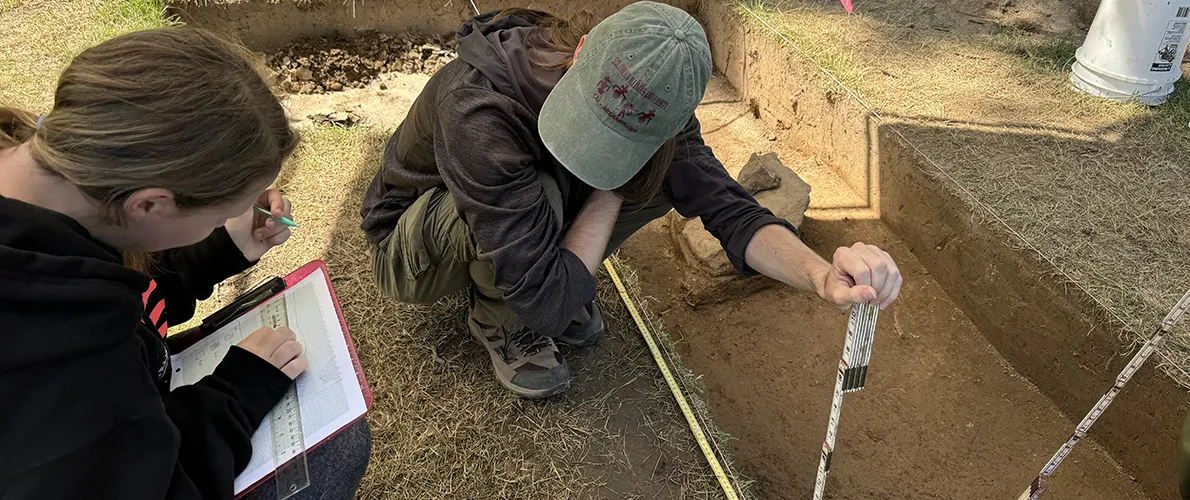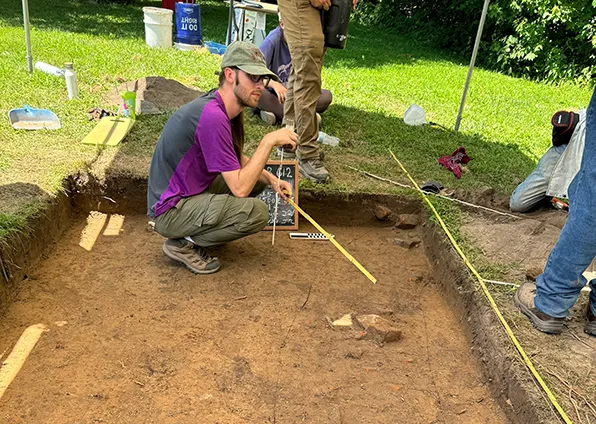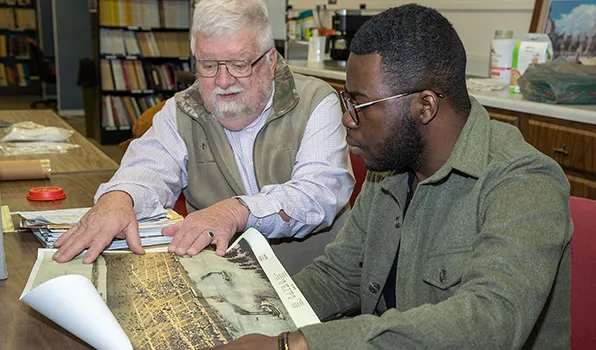Main Content
Bachelor of Arts in Anthropology

Humans are an intriguing species known for their creativity, conflict, cultural transmission, and ritual creation. Despite our individual differences, we share a profound biological connection, with 98.7% of our DNA matching that of bonobos. Anthropology delves into these complexities, exploring the significance of our actions and traditions and fostering a deeper understanding of what it means to be human.
Anthropology is a social science — bridging the humanities with social, earth, biological and chemical sciences. It is a research-based discipline, but it is also a way of understanding the human condition itself. You’ll benefit from the in-the-field experience of your professors and teachers and you can get involved with on-going research. Or you might take a deep dive into a topic of your own. In Anthropology, the world is your classroom, and you will see humans through the lens of Anthropology that brings focus and clarity to human diversity.
Watch our video

Bachelor of Arts Degree Requirements
The Anthropology degree program can be earned by fulfilling the requirements for the Bachelor of Arts degree.
- Total Degree Requirements: 120 credit hours
- University Core Curriculum: 39 credit hours
- College of Liberal Arts Requirements: 12 credit hours
- Major Requirements: 33 credit hours
- Approved Electives: 36 credit hours
![]() Check out the undergraduate Curricular Guide, which helps you outline what courses you would want to take each semester for all four years.
Check out the undergraduate Curricular Guide, which helps you outline what courses you would want to take each semester for all four years.
Minor
A minor can help focus a major and make it more specific. Or it can supplement a major and give it greater flexibility.
Anthropology majors often find these interdisciplinary minors relevant to their goals: Africana Studies, Forensic Science, Latino and Latin American Studies, Native American Studies, Women, Gender and Sexuality Studies.
Other majors that pair well with Anthropology include Art History, Biological Sciences, Business Management, Communication Studies, Economics, Geography and Environmental Resources, Geology, History, Linguistics, Marketing, Music, Philosophy, Political Science, Psychology, Public Health, and Sociology.
Program Tracks
Archaeology.
Biological Anthropology.
Sociocultural Anthropology.
Linguistics.
Facilities
The Center for Archaeological Investigations (CAI) is the premiere archaeological research center in southern Illinois. Our research staff are focused on developing research projects that provide students with experiential learning opportunities to help prepare them for careers in archaeology and related fields. Since 1978, the CAI's research agenda has been recognized internationally for the contributions that our staff have made within the field of archaeology.
Field School
Since 1970, our Archaeology Field School has been a vital hub for immersive learning in anthropology. Open to majors and students from related fields, the program is led by a dedicated team including a faculty member or senior doctoral student and two graduate teaching assistants. Emphasizing essential excavation and laboratory techniques, the school offers hands-on experience in artifact analysis. Selection criteria prioritize academic achievement, fieldwork experience, and a passion for archaeology, ensuring a rich learning environment for all participants.
Scholarships
Anthropology proudly awards several endowed scholarships to undergraduate students each year.
Undergraduate anthropology majors can apply for departmental, college, and university-level scholarships.
Careers
If you want to become a professional anthropologist, you’ll probably need to continue your education past your bachelor’s degree.
The skill set you learn as an Anthropology major, though, applies to other career paths. You could find a career in business, for example. Your research and data analysis skills, as well as your understanding of human behavior, are good qualities for a career in marketing and market research. Governmental agencies hire anthropologists in planning, research, and managerial roles. Other career paths include law enforcement or other areas of the legal system, education and training, or community-based and not-for-profit organizations. We’ll help keep you on a career-minded track as you earn your degree!
Contact Information
David Sutton,
Program Director
Faner Hall 3537
1000 Faner Dr.
Carbondale, IL 62901
618-453-5017
dsutton@siu.edu
Steven Sawyer
Academic Advisor
Faner 1229
1100 Lincoln Dr.
Carbondale, IL 62901
618-453-3388
ssawyer@siu.edu




